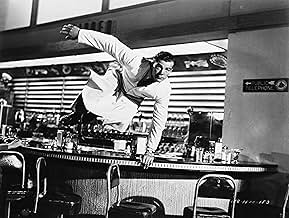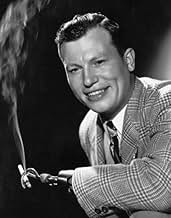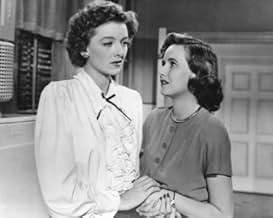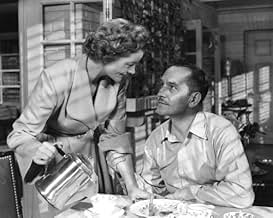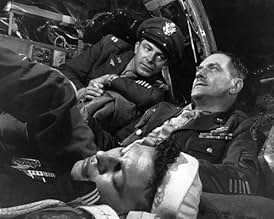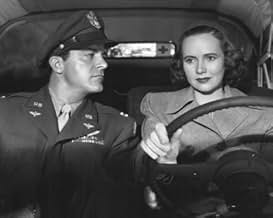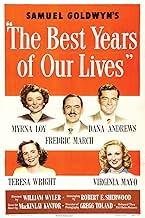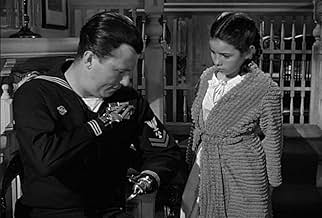Tres hombres que regresan de la guerra a su ciudad realizan juntos la etapa final del viaje y entablan amistad. Cada uno se encuentra, a su manera, con dificultades para adaptarse de nuevo a... Leer todoTres hombres que regresan de la guerra a su ciudad realizan juntos la etapa final del viaje y entablan amistad. Cada uno se encuentra, a su manera, con dificultades para adaptarse de nuevo a una vida normal.Tres hombres que regresan de la guerra a su ciudad realizan juntos la etapa final del viaje y entablan amistad. Cada uno se encuentra, a su manera, con dificultades para adaptarse de nuevo a una vida normal.
- Dirección
- Guionistas
- Elenco
- Ganó 7 premios Óscar
- 25 premios ganados y 4 nominaciones en total
- Al Stephenson
- (as Frederic March)
- Dirección
- Guionistas
- Todo el elenco y el equipo
- Producción, taquilla y más en IMDbPro
Resumen
Opiniones destacadas
Back in 1946, it was a jaw-dropper to have a character in a movie utter the word "divorce" or to aver an intent to break up a marriage -- such ideas just weren't voiced in films then. To modern audiences, they come across as melodramatic, but I'm told they elcited genuine gasps from audiences then.
Even more astonishing was William Wyler's decision to cast real-life amputee Harold Russell in the key role of a returning Navy veteran. Until <i>The Battle of Britain</i>, in which an actual, disfigured RAF veteran made a cameo appearance, directors didn't make those sorts of courageous gestures. The intimate yet innocent scene in which Homer Parrish (Russell) demonstrates his helplessness to his fiancé Wilma Cameron (Cathy O'Donnell) is beautiful, heartbreaking and uplifting; later, during the wedding scene, Russell stumbled over a line in saying the vows, and Wyler left the humanizing mistake in, God bless him for it.
Definitely a family orientated movie (Cert U) this will appeal to and find favour with all ages, but don't start thinking that this is all gooey, slushy nonsense. There's some quite hard-hitting topics covered, even by today's standards and of course, with our minds on our current troops in Iraq/Afghanistan, equally relevant.
Multi-stranded, which each of the three G.I.'s immediate and extended families and friends being examined, it's about them coping, with varying degrees of success, with home life and getting jobs, now that the War is ended. It's the little observations and stories around them that are so fascinating, as the Heroes of yesterday are now anything but when it comes finding new purpose in a changed world.
The cast is exemplary, not necessarily the biggest stars of the day but the most believable and natural for their roles. Dana Andrews, Myrna Loy and Fredric Marsh are the ones most easily recognisable and their appearances convey a sort of reassuring familiarity and normality. They're all excellent, of course.
Though long, at nearly 3 hours, William Wyler's easy going but assured and tight direction keeps things flowing nicely and it never drags. This, my second viewing, is an enjoyable one as the first and if anything I'm more at ease with it.
Though obviously not as exciting or dramatic as other 'normal' war films, it's a tragedy that it's not more well known. I've never seen it to ever have been on TV, or to my recollection, even Sky Movies, for that matter. Any movie that won 7 Oscars and is currently no. 180 in the top 250 IMDb's films of all time, voted by its voters (us, the public) is hardly one of minority interest.
A friend I lent my DVD to watched it with his family and normally they only go for current films, or ones they know, but they not only enjoyed it, but felt enormously moved by it, too.
If you haven't seen The Best Years... yet, make a mental note to do so. Your life won't change by doing so, but it really is worth the 3 hours of it that it will take. You certainly can't say the same about every film out there....
William Wyler's direction is breathtaking. One of the most moving scenes occurs early on in the film, when Homer, the young disabled Navy veteran, arrives at his family home and stands for a moment on the front lawn. For that one second there is an exquisite stillness that communicates a depth of emotion that can't be expressed physically. Then, just as the tension becomes almost unbearable, Homer's little sister Louella comes to the front door and runs out to greet him. In a similar way, the scene where Al Stephenson comes home to his wife and children is so finely directed you can almost feel that you're in the apartment with them--that it's your husband or father come home to you from the war--and you're experiencing the sheer elation of their physical nearness.
This aspect of the film--its portrayal of the joys and hardships of post-war readjustment and the veterans' experience--is what makes it so enlightening, honest and powerful. As a young woman, I have never experienced wartime or had my father, brothers or friends go off to fight. The film moves swiftly but seamlessly from the initial joy of homecoming and reunion to the problems, anxieties and humiliations that the three veterans encounter as they attempt to build a new life for themselves and their families.
I found it interesting how the film tries to give a picture of the different socio-economic backgrounds of the three men, and show the emergence of an affluent, market-driven economy. While this in itself is not bad, different episodes in the film show how this economic approach can conflict sharply at times with enduring human values such as integrity and justice. Al's dealings with the young veteran Mr Novak, who comes to him for a service loan to buy a farm, and his later (slightly tipsy) speech to a business gathering show this. Al declares at the end of his speech that when the bank lends money to poor veterans it will be a financial gamble but "we'll be gambling on the future of this country".
The film's interweaving of the characters and their struggles never falters and is deeply satisfying. Even as Al and Milly, Homer and Wilma gradually move towards a happy resolution of their difficulties this positive strand of the film is counter-balanced by the focus on Fred, the courageous Air Force captain who, in the eyes of the commercial world is "unqualified", suitable only for a job at a soda fountain, and in the eyes of his war bride, Marie, is only wonderful when he's dressed up in his officer's uniform. Fred's situation seems only to deteriorate and at one point in the film, after he farewells his elderly father to leave town and look for work, the father finds the citations for Fred's medals and sits down to read them. As he reads the words describing Fred's bravery and dedication to duty while he was terribly wounded in his aircraft, Pat Derry's voice nearly breaks with pride and love for his son. The film beautifully juxtaposes Fred's unselfish conduct and willingness to make the ultimate sacrifice with the cold indifference of a country in peacetime that does not want him and seemingly has no place for him.
The actors are uniformly impressive and really make their characters come alive. Dana Andrews is especially outstanding together with two young actors making their debut, Harold Russell and Cathy O'Donnell, as Homer and Wilma. Personally, I loved Homer and Wilma's story the best among those of all the characters,and the resolution is a simple, sensitively shot scene that lifts the whole film to a new point of happiness, gratitude and release. Both Cathy O'Donnell and Teresa Wright are lovely, gifted actresses with a slightly understated style, that is perfectly suited to the film's restrained but powerful tenor. This is demonstrated especially well in the tense scene where Wilma tries to talk to Homer in the shed, and in the scene where Peggy confides her heartache to her parents.
One feature that adds significantly to the film's quality is Hugo Friedhofer's score. The music is remarkably fresh and undated, has a strong, classic sound, and is poignant without being too romantic or sentimental (a flaw often found in other 1940s film scores).
The producer, Samuel Goldwyn, reportedly said of this film: "I don't care if it doesn't make a nickel...I just want every man, woman and child in America to see it". Although I'm not American (I am Australian) I found this film, with its universal human themes and its portrayal of post-war readjustment, speaks to anyone who shares in this heritage of WWII. Tell others about this film--it is breathtaking, beautiful and brave. See it and remember.
Crafted with care, narrated with flair & incessantly human in its approach, William Wyler's film's silent, thoughtful contemplation on PTSD is still as relevant today as it was at its time of release. Firmly grounded in realism & having stood the test of time all these years, The Best Years of Our Lives is one of the finest offerings of its kind.
Oscars Best Picture Winners, Ranked
Oscars Best Picture Winners, Ranked
¿Sabías que…?
- TriviaFor his performance as Homer Parrish, Harold Russell became the only actor to win two Academy Awards for the same role. The Academy Board of Governors thought he was a long shot to win, so they gave him an honorary award "for bringing hope and courage to his fellow veterans through his appearance." Later in the ceremony, he won for Best Supporting Actor.
- ErroresWhen Al introduces his wife and daughter to Fred and Homer at Butch's, he refers to Dana Andrews as Homer and Harold Russell as Fred. This was intended as a consequence of Al being drunk.
- Citas
[after Peggy tells her parents that they never had any trouble in their relationship]
Milly Stephenson: "We never had any trouble." How many times have I told you I hated you and believed it in my heart? How many times have you said you were sick and tired of me; that we were all washed up? How many times have we had to fall in love all over again?
- Créditos curiososThe character played by Ray Teal (the Axis sympathizer whom Homer Parrish attacks at the soda fountain) is listed in the credits as "Mr. Mollett". However, the character's name is never mentioned or otherwise alluded to.
- Versiones alternativasThe film was modified to play on a wide screen and reissued on February 3, 1954.
- ConexionesEdited into Titán del espacio (1950)
- Bandas sonorasAmong My Souvenirs
(1927) (uncredited)
Music by Edgar Leslie
Lyrics by Lawrence Wright
Played on piano by Hoagy Carmichael
Selecciones populares
Detalles
- Fecha de lanzamiento
- País de origen
- Idioma
- También se conoce como
- The Best Years of Our Lives
- Locaciones de filmación
- Productora
- Ver más créditos de la compañía en IMDbPro
Taquilla
- Presupuesto
- USD 2,100,000 (estimado)
- Total en EE. UU. y Canadá
- USD 23,650,000
- Total a nivel mundial
- USD 23,667,133
- Tiempo de ejecución2 horas 50 minutos
- Color
- Relación de aspecto
- 1.37 : 1
Contribuir a esta página



